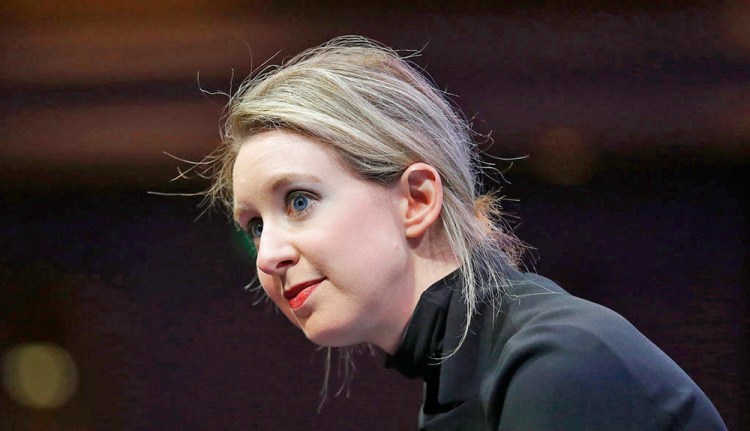Elizabeth Holmes, founder and chief executive of the blood-testing company Theranos, has been charged by the Securities and Exchange Commission with an “elaborate, years-long fraud” in which she and former company President Ramesh “Sunny” Balwani allegedly “deceived investors into believing that its key product – a portable blood analyzer – could conduct comprehensive blood tests from finger drops of blood.”
Holmes agreed to a $500,000 penalty and a 10-year ban on serving as an officer or director of a public company to settle the charges, but she did not admit or deny the allegations.
Jeffrey Coopersmith, an attorney Balwani, said in a prepared statement that his client “accurately represented Theranos to investors to the best of his ability.”
Holmes is relinquishing shares and ceding her voting control of Theranos, which was on the verge of bankruptcy late last year. She will not profit from her remaining ownership stake until money is recouped by other investors and shareholders.
Theranos, a blood-testing start-up that promised to revolutionize consumers’ access to their medical information, was a Silicon Valley darling once valued at $9 billion.
Holmes had the perfect backstory: a college-dropout-turned-chief-executive who had assembled a company board filled with powerful ex-government and military leaders and wanted to change the world. Her personal story about a fear of needles driving her to develop a better solution was heavily featured in the media, even as some medical experts puzzled over what was so novel about her technology and asked for evidence that showed how it worked and why.
The company fell from grace in a snarl of regulatory problems and the revelation that its proprietary technology was not even being used in its blood tests, as first reported by The Wall Street Journal.
The SEC alleges that Holmes, Balwani and Theranos raised more than $700 million from investors by misrepresenting the capabilities of the proprietary blood-testing technology that was at the core of its business – as well as by making misleading or exaggerated statements about the company’s financial status and relationships with commercial partners and the Department of Defense.
Theranos’s miniLab blood analyzer “was not commercially ready” in 2010 when Holmes and Balwani decided to try to sell their services to consumers through partnerships with unnamed pharmacy and grocery chains, the SEC complaint says. The commercial partners are not named by the SEC, but Theranos opened wellness centers in Walgreens drugstores in Arizona and California. The Wall Street Journal previously reported that Safeway spent $350 million to build wellness clinics in its stores. Both agreements have since been terminated.
When the technology was due to be launched in the first drugstores in September 2013, it was not ready, according to the complaint. Instead, Holmes and Balwani allegedly asked company engineers to modify technology already commercially available to analyze samples – but never told their commercial partners.
Holmes and Theranos created elaborate technology demonstrations in which they showcased their own proprietary analyzers, but actually processed the samples on machines made by other vendors. For example, Holmes allegedly led executives from the pharmacy company on a tour, including a room full of miniLab analyzers that were not able to be used for clinical testing, leaving the impression that samples could be clinically analyzed there.
The complaint also alleges that Holmes and Balwani reassured the grocery chain that their proprietary technology could perform 90 percent of the most commonly used blood tests, when the proprietary technology was capable of only a dozen clinical tests.
Holmes met with investors, explaining her fear of needles and her vision for fast, cheap blood testing. Potential investors would receive a fingerstick blood test and then see the sample inserted into Theranos’s device or taken away to be analyzed, leading them to believe samples were being analyzed on the technology the company had invented.
Holmes allegedly told investors that the company did not need approval from the Food and Drug Administration. But in late 2013 and 2014, the FDA communicated to Theranos and Holmes that the company needed FDA approval or clearance of its tests.
Theranos also projected that the company would generate more than $100 million in revenue in 2014; in fact, the company recorded $100,000 in revenue, according to the SEC.
The SEC also alleges that Holmes claimed to investors that Theranos technology was being used by the Defense Department on the battlefield in Afghanistan and on medevac helicopters. Those statements “were important to potential investors because these relationships lent legitimacy to Theranos’s business and its proprietary analyzer,” the SEC alleges.
That technology was never deployed on the battlefield by the Defense Department, even though Marine Gen. Jim Mattis, who then led the U.S. Central Command, personally pushed for it. Regulatory officials in the military had flagged problems with Theranos’ approach. Mattis later joined Theranos’ board; he resigned to become defense secretary.
“The Theranos story is an important lesson for Silicon Valley,” Jina Choi, director of the SEC’s San Francisco regional office, said in a prepared statement. “Innovators who seek to revolutionize and disrupt an industry must tell investors the truth about what their technology can do today, not just what they hope it might do someday.”
In a prepared statement, Theranos’ independent board of directors said the company is “pleased to be bringing this matter to a close and looks forward to advancing its technology.”
A lawyer for Holmes declined to comment.
Send questions/comments to the editors.



Comments are no longer available on this story